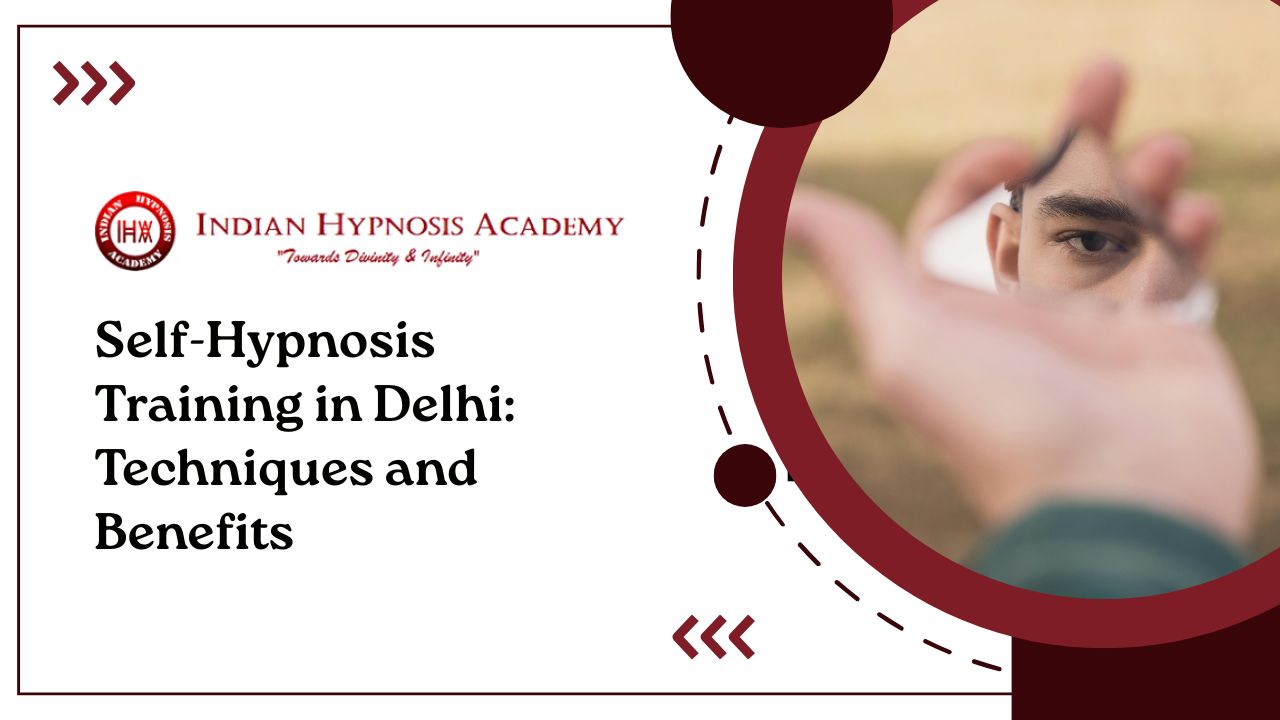Have you ever wondered how some people effortlessly tap into their inner strength to overcome obstacles and achieve their goals? The secret may lie in the fascinating world of self-hypnosis. Imagine being able to harness the power of your own mind, guiding it towards relaxation, focus, and positive change. Self-hypnosis isn’t just a mystical concept; it’s an accessible tool that can transform your life. In bustling Delhi, where stress levels soar amidst fast-paced living, self-hypnosis training offers a practical solution for enhancing well-being. Let’s explore what this intriguing practice entails and discover its techniques and benefits together!
What is Self-Hypnosis?
Self-hypnosis is a powerful mental technique that allows individuals to enter an altered state of consciousness. This state is often characterized by deep relaxation and heightened focus. During this process, the mind becomes more receptive to suggestions.
Unlike traditional hypnosis, which typically involves a practitioner guiding someone into trance, self-hypnosis empowers you to harness this experience independently. You become both the hypnotist and the subject.
At its core, self-hypnosis helps tap into your subconscious mind. It aims to facilitate positive changes in thoughts and behaviors without external intervention.
Many people use it for various purposes such as stress relief, enhancing creativity, or overcoming fears. With practice, anyone can learn how to effectively utilize this skill for personal growth and transformation in everyday life.
The History and Science behind Self-Hypnosis
Self-hypnosis has roots that trace back to ancient civilizations. The practice was utilized in Egypt and Greece, where it was often linked with healing rituals and spiritual experiences.
In the 18th century, Franz Anton Mesmer popularized techniques resembling hypnosis through his theories of animal magnetism. His work laid a foundation for modern exploration into consciousness.
The scientific understanding of self-hypnosis began gaining traction in the late 19th century. Figures like Sigmund Freud incorporated hypnotic techniques into their therapeutic practices, recognizing its potential for accessing deeper mental states.
Today, neuroscience supports these methods by demonstrating how self-hypnosis can alter brain waves and promote relaxation. Studies show that specific brain regions become more active during induced trance states. This blend of history and science illustrates how self-hypnosis continues to evolve as a valuable tool for personal development today.
Techniques for Practicing Self-Hypnosis
Self-hypnosis is an accessible skill that anyone can learn. One effective technique involves finding a quiet space where you can relax without distractions. This sets the stage for deeper focus.
Once settled, take slow, deep breaths to calm your mind and body. Visualization plays a crucial role here; picture a peaceful scene or experience that brings you joy. Allow yourself to immerse fully in this mental imagery.
Another method is using affirmations or positive suggestions tailored to your goals. Repeating phrases like “I am confident” helps reinforce desired changes in your mindset.
You might also explore progressive relaxation, where you consciously tense and relax each muscle group. This process not only enhances physical comfort but also prepares your mind for hypnotic states.
Keeping a self-hypnosis journal can track progress and refine techniques over time, making it easier to identify what works best for you on this journey toward personal growth.
Benefits of Self-Hypnosis Training
Self-hypnosis training opens the door to a world of personal growth. It equips individuals with tools to manage stress effectively. By tapping into the subconscious mind, one can diminish anxiety and enhance relaxation.
Another significant benefit is improved focus and concentration. Many find that self-hypnosis helps them achieve a state of heightened awareness, making it easier to tackle tasks with clarity.
Additionally, this form of training aids in breaking unwanted habits. Whether it’s smoking or overeating, self-hypnosis provides strategies to modify behavior positively.
Moreover, it fosters emotional well-being by promoting self-acceptance and confidence. Participants often report feeling more in control of their thoughts and emotions after practicing these techniques regularly.
Self-hypnosis can significantly improve sleep quality. Those who struggle with insomnia may discover that accessing deeper states leads to restorative rest without reliance on medication.
How to Find a Reputable Self-Hypnosis Trainer in Delhi
Finding a reputable self-hypnosis trainer in Delhi can be an enlightening journey. Start by researching local institutions, such as the Indian Hypnosis Academy (IHA). Their programs are tailored to provide certified training and valuable insights into techniques.
Look for online reviews or testimonials from former students. Authentic experiences offer a glimpse into the effectiveness of their teaching methods.
Networking within wellness communities can also help. Attend workshops or seminars where you might meet trainers firsthand. Engaging with professionals face-to-face provides a sense of trust and reliability.
Check credentials and experience levels too. A qualified trainer should have relevant certifications and practical knowledge in hypnosis practices.
Don’t hesitate to ask questions during initial consultations. This helps gauge their approach to training, ensuring it aligns with your personal goals for self-hypnosis practice.
Real-Life Success Stories of Self-Hypnosis
Many individuals have transformed their lives through self-hypnosis. One inspiring story comes from a young woman named Priya, who struggled with intense anxiety. After attending self-hypnosis training at the Indian Hypnosis Academy, she learned techniques to calm her mind and focus on positive affirmations. Gradually, she regained control over her thoughts.
Another remarkable example is Raj, a businessman dealing with chronic stress. Through consistent practice of self-hypnosis techniques taught in Delhi, he found clarity and increased productivity at work. By visualizing success during his sessions, Raj turned his professional life around.
Then there’s Meera, who used self-hypnosis for pain management after an injury. Utilizing specific methods learned during her training helped her reduce discomfort significantly.
These stories showcase the diverse applications of self-hypnosis across various challenges people face daily. Each journey highlights how powerful the mind can be when guided effectively.
Conclusion: The Power of the Mind and the Potential of Self-Hypnosis
The journey into self-hypnosis reveals the incredible power our minds hold. Self-hypnosis training can serve as a valuable tool for personal growth, emphasizing empowerment and self-discovery. With techniques that promote relaxation, focus, and positive change, individuals can unlock their potential to overcome challenges.
As more people turn to practices like these in urban settings such as Delhi, the interest in developing one’s mental abilities grows. The Indian Hypnosis Academy (IHA) stands out as a reputable place where enthusiasts can learn effective methods tailored for various needs.
Real-life success stories continue to inspire others on this path of transformation. From overcoming anxiety to enhancing performance in professional fields, the benefits are compelling.
Self-hypnosis is not just about accessing a trance-like state; it’s about harnessing your mind’s capabilities. The possibilities are vast when you commit to understanding and mastering your thoughts through consistent practice. In this age of constant distraction, dedicating time to self-reflection and mental clarity may be what brings true fulfillment. Embracing self-hypnosis opens doors that lead toward a more balanced life filled with peace and accomplishment.




